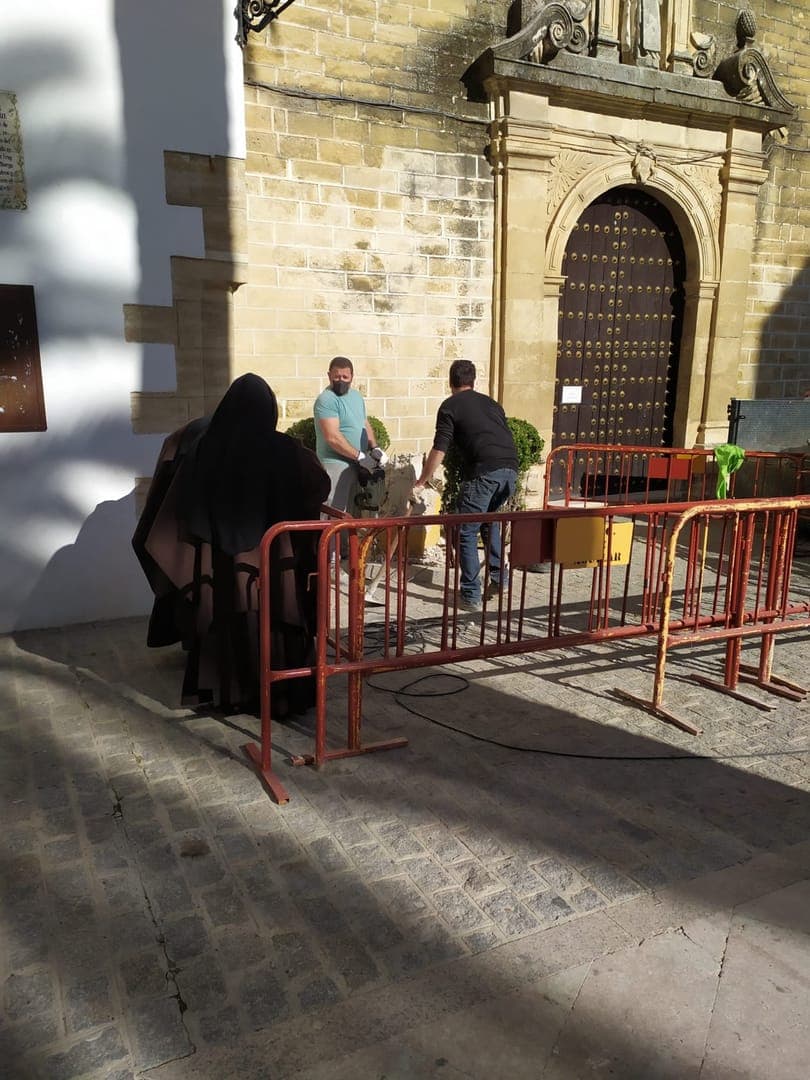ROSARIO, Argentina — The mayor of a small town in southern Spain forcibly removed a cross from the doors of a convent. The crucifix was then found in a garbage dump.
The events took place last week in the town of Aguilar de la Frontera, in the Diocese of Cordoba, in the Andalusia region in southern Spain.
The cross was located at the entrance of the church that belongs to the adjoining convent of the Discalced Carmelites, and had been there since 1939. It was erected to honor the Nationalist victims of Spain’s civil war, although the plaque noting this had long been removed in respect of all the victims of Nationalist leader General Francisco Franco.
The mayor of the town, Carmen Flores, from the pro-communist party Izquierda Unida, had the cross removed on Wednesday despite the fact it was in a part of the convent that was declared a National Historic Monument in 1983. The designation means that the exterior of the convent cannot be modified.
Sister Maravillas de Jesus, the mother superior of the Discalced Carmelites of Aguilar de la Frontera, told Spanish newspaper ABC that “we are dismayed and very hurt by the affront made to God Our Lord, for the sacrilege made to our Sacred Sign par excellence, which is the Holy Cross.”
“Everything we have lived is proof of the ingratitude of the children of God, who respond to him in this way when He fills us with joy and love every day,” she said.
“But we have prayed every day: we do not understand why these things happen,” said Maravillas de Jesus.
Today, there are five cloistered nuns in the convent, all coming from Peru.
Flores made the decision to remove the cross unilaterally, and without the approval of Spain’s registry of Assets of Cultural Interest. For this reason, the Spanish Association of Christian Lawyers filed a complaint against the mayor with the Court of Instruction of Cordoba.
In addition, the lawyers have noted, “the Cross does not violate the Historical Memory Law since it does not contain any inscription.”
Passed in 2007, during the government of Socialist Prime Minister Jose Luis Rodriguez Zapatero, the law recognizes the victims on both sides of the Spanish Civil War, gives rights to victims and their descendants, and formally condemns the 1936-1975 Franco regime.
“The mayor has recognized that from the Ministry of Culture, they were told that they couldn’t demolish the Cross based on the Law of Historical Memory, which shows that the decision is based on the discrimination and animosity she has towards Christians,” said Polonia Castellanos, the president of the Christian lawyers’ association.
Father Pedro Lora, the parish priest of the small town, wrote a letter to the faithful that was published in full by the Archdiocese of Cordoba. Speaking both as a “priest and a citizen,” he says that he respects legitimate laws and that he had tried to dialogue with local authorities to find a different way to proceed when it came to removing the cross and ordering it destroyed.
“Contemplating the sign of the cross thrown in a dump and knowing the order of its destruction has caused me deep pain, it has caused a wound in our religious feelings,” he wrote.
“I regret not having had the option of guarding our symbol, in the same way that I express the pain of the Carmelite sisters and our parish community who would have guarded the Cross and found another private location for it and thus extol its profound meaning for Christians,” the priest continued.
“Given the unease caused, as the parish priest of this community I only want my words to promote harmony and forgiveness among all the residents of Aguilar … I feel with my parishioners the immense pain for the damage caused to religious freedom: The Cross is the symbol, representation and foundation of our society of law,” Lora wrote.
“Living with hatred, resentment, or prisoners of criticism, as we are living these last days, does not bring anything good and brings out the worst in us, while it makes us live in a bitter society that takes us away from communion and prosperity,” he wrote. “The universal brotherhood, of which Pope Francis speaks in his encyclical Fratelli Tutti, is not built in this way.”
Fratelli Tutti was published last year by the pontiff, and is dedicated to the theme of human fraternity and a post-COVID-19 pandemic world.
Lora also urges the faithful to “follow Jesus Christ and follow him decisively.”
“Let us stay united in this follow-up, let us not let ideologies, of one kind or another, contaminate the purity of our religious sentiment, which must at all times include forgiveness and reconciliation,” he wrote. “Let us continue building together the civilization of love.”
Follow Inés San Martín on Twitter: @inesanma
















